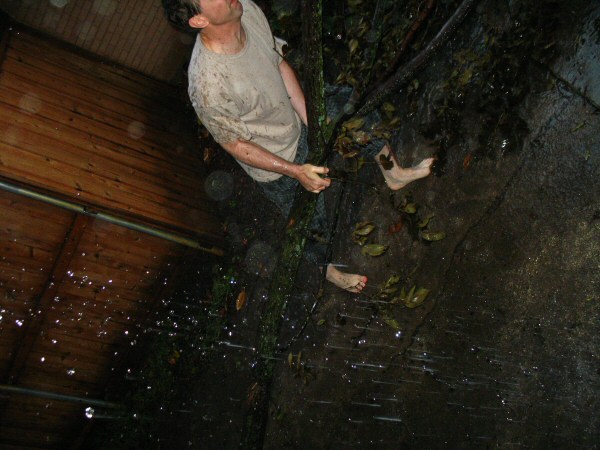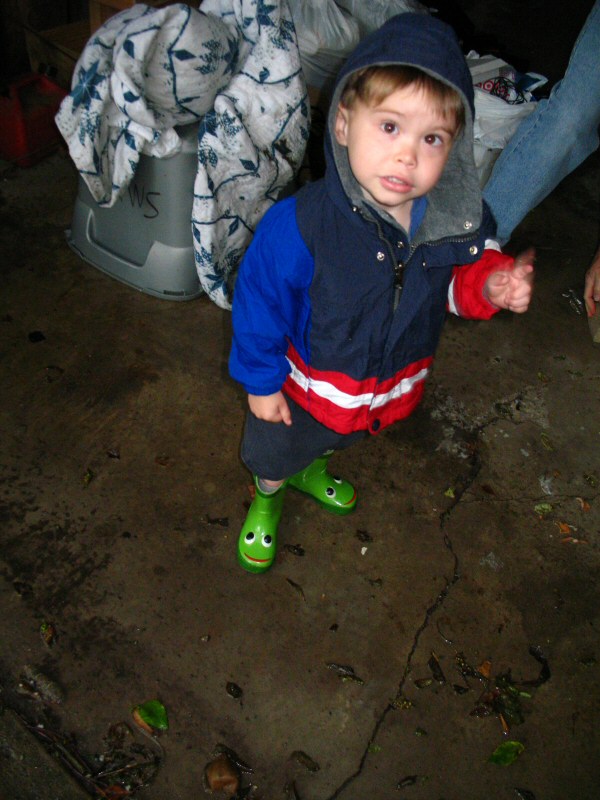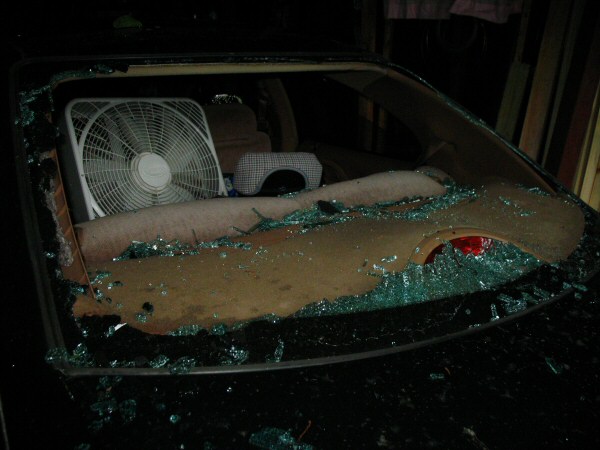August 28, 2009
We finally got the rain we've needed. All at once. And I take full credit.
Because one week prior, in another of my regular rounds of cost-cutting, I looked at the comprehensive insurance I carry on both our cars. One of them is 15 years old, the other 12. It makes little sense to have full coverage on vehicles that old, as neither one is likely to survive a crippling blow for anything less than total value. So I'd get a check for maybe $1,500 or so, after years of shelling out for full-price insurance. So what was the point? I canceled those parts of the policies online.
anyway, we got rain, all right. A deluge. Every drop that hadn't fallen over the past 12 weeks came together in a two-hour flying tsunami, propelled by paint-stripping winds and thunder that shook the rafters. Here's a slightly mad Michael, outside in it for reasons that will be apparent soon enough.
The insurance? Yes, that's coming back to the narrative in a moment.
Little Roo has a peculiar grasp of his own abilities. He'll lose all recollection of how to walk if it's in a direction away from where he really wants to go. But if Squeeky and I speak in excited voices about something big outside, he'll scurry around the house for his raincoat and umbrella and don his galoshes by himself if it means the chance to follow Daddy outside. Even in a thunderstorm.
That night, I'd left my car outside the garage, having displaced it with preparations for a money-raising garage sale the next day.
Anyway, yeah, here's the result.
One ginormous piece of elm tree came a-loose directly above the Taurus, turning a sheet of thermal-tinted glass into about 50,000 silicon crystals.
I never heard it happen. I just glanced outside to see if I'd closed the garage, and noticed the backyard's greenery seemed a bit thicker than usual. Then I yelled holy smokes there's a tree in my car and ran out to grab whatever tarps I could find to keep the rain out. Managed to round up a sheet of painter's plastic (worthless in the wind) and a child's wading pool (surprisingly effective), then ducked back inside before the wind, which hadn't let up, threatened to drop another log on me. At least for that I was still insured.
Next morning, a fellow parishioner referred me to an auto-glass service. For $380 they sent a guy out to make everything right (which is a hell of a bargain no matter how you look at it), but he warned that I'd be finding fragments in and around the car for months. There was just no way to get every bit out of every crevice.
The next afternoon, I set about sawing up the fallen branch and dragging it out to the curb. Naturally, Little Roo wanted to be part of that, and Squinx had to be included. I offered each of them a penny for every bit of glass they found on the driveway. The little eagles ended up draining me for nearly a dollar.
i rationalized the overall cost by adding up the insurance savings minus the deductible and the price of the window, and figured I'd break even by Christmas.
As for the rain? You're welcome.
Posted by: Michael Rittenhouse at
09:12 PM
| No Comments
| Add Comment
Post contains 552 words, total size 4 kb.
August 08, 2009
Posted by: Michael Rittenhouse at
07:41 PM
| No Comments
| Add Comment
Post contains 3 words, total size 1 kb.
July 26, 2009
After one week in South Africa I've acquired a lovely accent.
Anglo South Africans sound like well-heeled Australians; Afrikaners (Dutch descent) speak through a unique historical filter, which produces an English akin to that of a Norwegian reared in Quebec: soft Rs with rounded vowels (roondid vewills). I adjusted instinctively so as to sound less like the phonetical American. Now I'm somewhere between Cary Grant and William F. Buckley, Jr. after a strong cigar.
I picked up this affectation in Cape Town, which is a town on a cape. Cape Town's most prominent feature is Table Mountain, which is a mountain shaped like a table:
And South Africa is, of course, a republic in the south of Africa.
For the Afrikaners who named everything here, abstraction didn't seem to count much.
Regardless, their city comprises just about everything, as if the ships that used to sail by pre-Suez Canal dropped off 1 percent of their cargo as tribute, including people, cuisine, and architecture. I stayed in a 100-year-old house built by Englishmen and owned by an Afrikaner who drives a German car:
In the marketplaces, store shelves look fairly American in content and layout, and they all take Visa. The waterfront district resembles any recent U.S. seaside development, its nightlife pulsing to familiar pop tunes from the '80s and up. (Way better seafood, though.) One obvious colonial curse is right-hand drive, which makes crossing the street a calculated process for anyone but the British and Japanese. One's instinct to look left just before stepping off a curb can result in a flattening.
Also, they're still on the metric system. I think they do that just to be different.
getting to this part of the world calls for a New Zealand level of endurance. This flight marks the first time I've ever heard an airline PA specifically warn passengers against sleeping on the floor. I spent almost as much time in transit as in country, but that was my own devise, including a Washington-Johannesburg leg that stopped off in Dakar, Senegal, where the airport has one runway and no taxiways. As we were two hours late leaving Dulles, the possibility of a Casey Jones finish loomed large in my imagination. To my relief, from my viewpoint in the cabin (illustrated), I saw no near-collisions, nor cargo cults. An hour to refuel, and we were off.
the airport has one runway and no taxiways. As we were two hours late leaving Dulles, the possibility of a Casey Jones finish loomed large in my imagination. To my relief, from my viewpoint in the cabin (illustrated), I saw no near-collisions, nor cargo cults. An hour to refuel, and we were off.
Crossing this much of Earth puts a nasty spin on the usual time-disorientation. Were it simply a matter of adding or subtracting six hours on the body clock, I'd be fine. But the bonus north-south stretch confused me. I felt as if I'd burned two days flying, and I probably did. My only reliable gauge of time passing was the feel of my chin: A day's growth is a day's growth.
for the trip, verizon supplied me a GSM-compatible "world phone" for about $10, all of it shipping. Unfortunately their partner in sub-Saharan Africa is Vodacom, at $2.98 per minute. I resigned myself to texting for five cents incoming, fifty cents out. Fortunately, the time difference meant I could also chat online with Squeeky before my bedtime, which was the middle of her day.
In Cape Town, I watched a guy pull a nifty trick with Skype. He tuned his iPod Touch to a free wi-fi source, plugged in a headset, and called halfway 'round the world for almost nothing. At some point I expect dentists to wire our fillings for stuff like this.
Why was I in South Africa? Well, I was protesting apartheid. Yes, I know it ended in, like, '94 or something. But it's never too late for a little moral vanity.
the return trip seemed to burn less daylight, but I knew better. The trailing sun plays a cruel trick on the perceptions, its effects leavened only by the elation of reaching home again. To pass the time, I read a book and learned how to use my MP3 player, and watched He's Just Not That Into You start-to-finish before realizing it's a chick flick. Even so, being confined to a chair for 15 hours beats sailing for a month.
Snaking through a long line at U.S. immigration under the influences of jetlag and sleep deprivation, I wondered what Customs inspectors look for in the dishonest. (Not that I was re-entering the country with African beef jerky and Cuban cigars: Of course not.) To help us relax, Customs kindly hung enormous LED screens above us and showed a "Welcome to America" video, with heart-swelling music and quick cuts of happy citizens enjoying everyday life all over these United States. When a young woman on horseback raised the Stars and Stripes before a roaring crowd, I suddenly welled up. What would happen if I wept while handing over my passport? Would my agent understand that I was glad to be home, or just point me to the special line for smugglers who obviously couldn't hack it?
Right then I realized how badly I needed sleep. (Also a shower.) The longest hour still lay ahead of me, between Houston and Dallas. Even if I succeeded in eluding Customs scrutiny, my biggest carry-on prize—a bottle of codeine-fortified cough syrup obtained over-the-counter in Cape Town—could have gotten the heave-ho from a TSA official. Too many ounces. Narcotic content? Secondary.
I dropped the accent and glided through, unmolested.
Rittenhouse is home again, and happy about it.
Posted by: Michael Rittenhouse at
02:59 PM
| No Comments
| Add Comment
Post contains 911 words, total size 7 kb.
June 28, 2009
I didn't really mean to miscue the bishop.
He presided over mass last Sunday, and he packed the house. He has a monstrous reputation as a stand-up guy, and lots of people turned out to see him. For support, they even had extra servers on the altar—six or seven total.
No seats remained by the time we got there, so we took the ones nobody wants—front row—and settled in.
I really didn't mean to mess him up.
See, there's this moment just after the corporate confession where we sing "Glory be to God on high/And on earth peace, goodwill toward men...." and it goes on a little while. Then it closes with a collective "Amen," and we make the sign of the cross.
Except a couple of lines before that, I went to scratch my eyebrow, and the bishop was looking at me, and he immediately crossed himself.
That's all it took to get the other half-dozen servers going—sort of haphazardly, since they all kinda knew we were ahead of the choir—and when they started crossing, the whole congregation joined in.
Then we got to the "Amen," and nobody was sure whether to cross himself again.
So I guess I'm sorry, but really not, because we could all stand to make the sign of the cross more often, rather than less.
Posted by: Michael Rittenhouse at
08:01 PM
| No Comments
| Add Comment
Post contains 225 words, total size 1 kb.
May 31, 2009
You never expect to watch someone die, do you?
Oh, there are exceptions. Terminal illness, executions, accompanying a friend to his first open-mic night.
But this one, I didn't see coming.
Squeeky returned from the grocery store with a worried look. Seems there's an old man on the next street, lives alone, house nearly burned down a few years ago, and now he's outside dragging ladders and a chainsaw around the yard, sporting a mountaineer's harness.
You know, the sort of foolishness I would entertain if I didn't have dependents.
I got the message: Go see what the old coot's up to and do what you can to keep him from killing himself. Because, you know, he's a lot like you, 40 years from now.
Okay, I made up that last sentence.
i set off around the corner and found him sitting on his porch with an extension ladder across his lap. He seemed perplexed at how the ladder's rope had gotten misrouted; he couldn't make it extend. But he'd installed the rope himself.
This was my first indication that he wasn't all there.
He introduced himself and looked me over. Must be an engineer, he surmised, some sort of thinking man who knows a little about everything. I allowed that I was a writer, an engineer of words.
Close enough. Then he began a monologue on his theory about photons having mass. Including his detailed description for mounting lasers atop two mountains, using cesium clocks to time the discharges, provided Earth's rotation was factored in. He'd called some sort of research facility and laid out his theory for a genuine physicist.
Right about then I concluded he'd gone 'round the bend, and plotted to head off any attempt he might make to scale the ladder with his chainsaw. I helped him re-thread the extension rope so the ladder would work properly, but when I went to stand it up, he waved me off. You've got affairs to manage, he said. Finish your walk.
He didn't directly order me off the property, so I stayed. It took everything in me not to grab the ladder as he walked it, wavering, over to an enormous red oak.
That limb up there, you see. It's dead. Got to cut it down before it falls on somebody.
The branch stretched across the walkway, but with the number of visitors he probably had, the odds on it actually braining someone seemed remote. But nothing would stop him, now that he had the harness cinched up, the ladder extended, and the chainsaw plugged into an extension cord.
I know that feeling. It's called momentum, and it's the most irresistible and stupid force in Rittenhouse's brain.
i studied the ladder and noted that if I were climbing, I'd want it set back a bit so it was less steep. He took a sidelong look and agreed, dragging it back about four feet. This would lower its height slightly, but he'd be safer reaching a bit for the branch than keeling over just as he got situated.
He tied a rope to the saw and started up, hooking his harness to each rung as he progressed. I figured when he took the plunge, he'd bring the ladder down with him.
He got to the top before stopping my heart completely with the announcement that he'd need to turn completely around and face away from the ladder to reach the dead limb.
With a chainsaw. On a rope.
About then I recognized my only possible part in this scene: I would summon help on my cell phone while administering first aid with ... what?
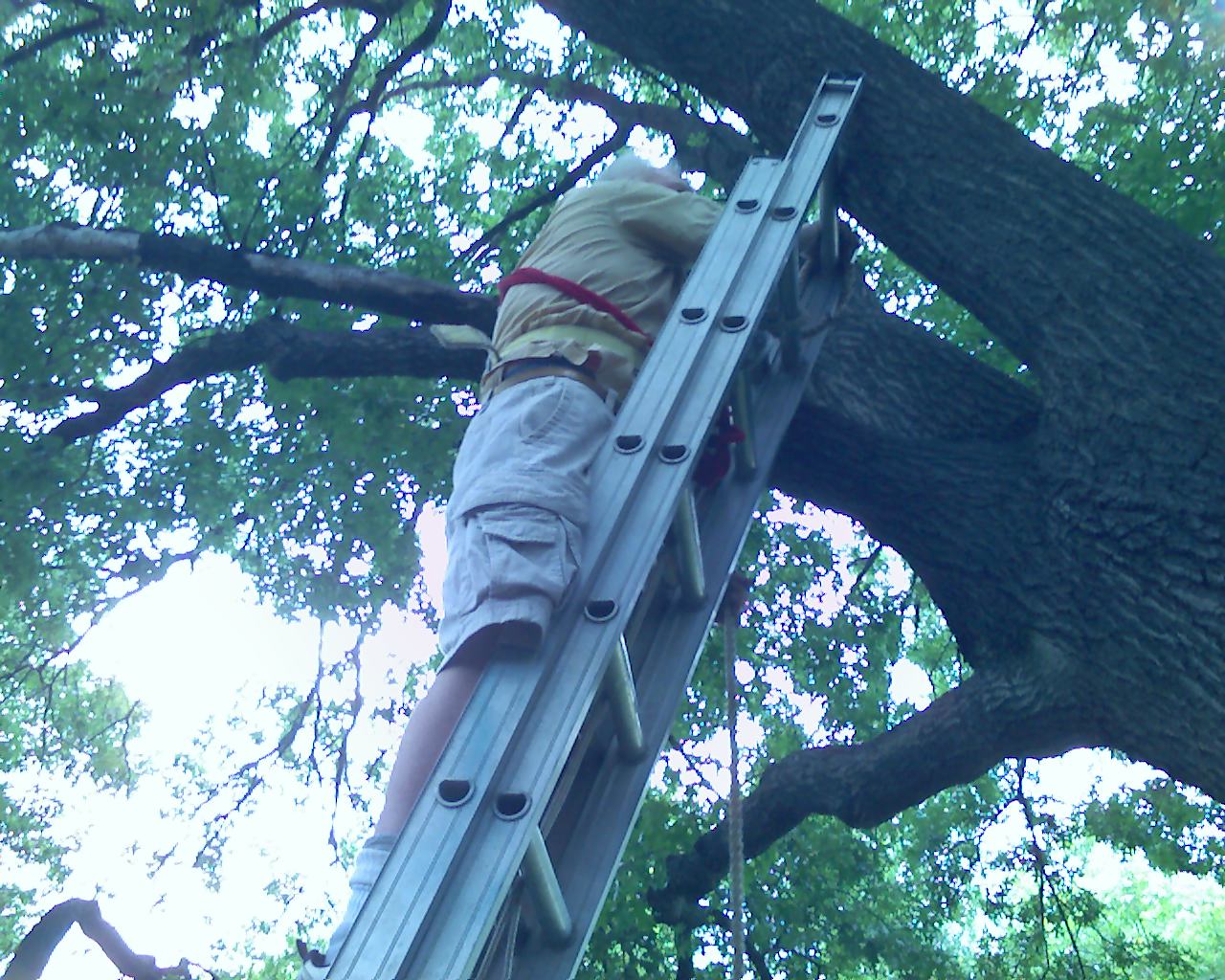
He ground at the limb with his saw until the strain of holding it out at arm's length made him pause. After wheezing for a moment, he went at it again. I could see the chain was making little dust, but a lot of smoke. He wasn't holding it straight in the groove, and the motor strained. On his next break he blamed the dry wood. I allowed it was difficult to get the right angle from where he stood. He hefted the saw up and went at it again.
After another couple of minutes the branch started to crack. By then the old man had the chainsaw extended at the full length of his arm. I could see it coming: the limb would give, the saw would swing down, and the chain would slice into his leg, buckling his knees. And no way could I do anything to break his fall. He would just have to hit the dirt and I'd pray it was soft enough not to kill him outright.
Or, maybe that would be the best outcome. What 84-year-old wants to lie in a hospital bed for weeks while his hip, femur, vertebrae, and humerus knit back together?
When the limb finally gave, the saw did plummet, but it only smudged his pants with oil. I dragged the fallen branch to one side of the walkway while he trimmed up the cut.
Nice of you to stop by, he said. Go along and tend your family now.
I took that as my direct invitation to leave, and headed off. But then I hid by some bushes where I could watch him climb down. Once on the ground, he might let the ladder crash, or drop his chainsaw, but he wouldn't topple over without my reacting.
He made it. He didn't actually die.
But he could have, easily.
This is still a good story, right?
back home, inspired by the old goof, and having just replaced my computer's decade-old CRT with a snazzy new widescreen, I decided to try something ill-advised for your amusement.*
Possibly the biggest letdown in Rittenhouse comedy history.
I even tried it again.
Unlike men, monitors stop working before they get hard-headed.
* All computer equipment used in this production was properly disposed of in accordance with local, state, federal, and United Nations protocols.
Posted by: Michael Rittenhouse at
07:57 PM
| Comments (1)
| Add Comment
Post contains 1014 words, total size 7 kb.
May 21, 2009
I have a temporary dilemma you may be able to help me with.
Each weekday afternoon, if I leave my office promptly at 5 p.m. CDT, I can turn my car radio on just as your opening monologue begins on 92.9 KSKY.
From there, I head home, and if the traffic lights click just right I can stop at the grocery store during the first commercial break (sorry, sponsors) with just enough time to get a couple of items through the self-checkout before you retake the mic.
Over the past couple of weeks, however, there's been a problem.
My Ford Taurus, an exceedingly reliable car for many years now, has developed an electrical quirk. It's the transmission control switch, and when the TCS fails on this particular car it has some rather bizarre consequences.
Intermittently, it knocks out the power steering, windshield wipers, power windows, and—here's the worst part—the radio.
In the time it's taken to diagnose this and order a replacement part, however, I've learned that I can make all the symptoms disappear by shifting into park or neutral. This opens up a workaround.
I still leave the office at 5:00, then punch the throttle hard out of the parking lot, shifting into neutral after a bit so I can listen to your show while coasting. This works marvelously on Thursdays, when I goose it during your questions then throw it into neutral as Mark Steyn responds. However, at some point I usually wind up nursing the car along at school-zone speeds waiting for Steyn to wrap it up. My fellow commuters seem to dislike this.
So, until I can get the car fixed, I need a favor. Perhaps you and Steyn could take frequent, simultaneous, deep breaths during your exchanges. Or, smoke cigarettes. (Can you get a tobacco company sponsor?) Short interruptions like that would give me the seconds I need to keep up with traffic in drive while missing as little of your commentary as possible.
Cordially,
Michael Rittenhouse
www.michaelrittenhouse.net
Posted by: Michael Rittenhouse at
08:56 PM
| No Comments
| Add Comment
Post contains 336 words, total size 2 kb.
May 12, 2009
My thanks to Scott Braddock of KRLD 1080 for having me on his Nightly News Roundup Tuesday night.
Braddock refereed between me and Gary Nolan on the subject of Miss USA contestant Carrie Prejean's now-famous answer to a pageant judge's question about same-sex marriage. The controversy wasn't Prejean's words but the later, nasty reaction from the judge and his allies.
As the audio tells, Nolan and I agreed that in an ideal world, government ought not to be involved in defining marriage. However, we don't live in an ideal world.
Braddock gave us a generous chunk of time to hash this out. Still, there are a few points I wish I'd had time to make:
- Marriage is organic. It pairs man and woman as they are made. The church institutionalized this, and the state followed suit.
- Natural law is critical to the recognition of marriage. To redefine marriage as anything other than one-male-one-female doesn't follow natural law. So at the outset, the concept of same-sex marriage is morally disadvantaged. It has no inherent value to warrant state (or church) recognition.
- Furthermore, neither the church nor any civilized state recognize polygamy, which also contradicts natural law because it awards more than one female to a male.
Let me elaborate on polygamy, because its history illustrates so clearly what happens when we disregard natural law in favor of mere "want."
By nature, humans are created male-female at roughly a 50-50 ratio. Consequently, in a polygamist society, many males—namely the least wealthy and powerful—will never marry. With no place in society, these "lost boys" end up as poorly educated exiles with no support from their family. It's a recipe for a life of nihilism.
It is no coincidence that of the 19 young men recruited to carry out the 9/11 suicide missions, 15 were from the polygamist state of Saudi Arabia.
So, to preserve the peace, the state simply must follow the church in defining marriage as spelled out in natural law.
a thoughtful host, braddock posed a question I didn't anticipate: Wasn't the nastiness directed at Prejean similar to that vented toward the Dixie Chicks some years back when their lead singer took a cheap shot at President Bush during a concert?
Something about that metaphor didn't sit right with me. On reflection, I'd say it would have been more apt if the Dixie Chicks were compared to Prejean's questioner.
Prejean didn't ask to talk about gay marriage on the Miss USA stage. It was a pageant judge who introduced politics where no one ever had before.
Natalie Maines also hauled a hot political matter into a forum where her fans didn't expect it—the entertainment stage. For that, she and her band got a reaction they well could have anticipated. They cannot claim to be victims of others' intolerance any more than President Bush could if he were jeered for breaking into a song at his State of the Union address.
So I'd put the judge, not Prejean, in the same category as the Dixie Chicks—one who violated his audience's trust by misappropriating a forum.
Unfortunately, Prejean was his innocent victim, unwilling to speak anything other than the truth, and she suffers for it.
As did the savior she follows.
Posted by: Michael Rittenhouse at
09:04 PM
| Comments (1)
| Add Comment
Post contains 542 words, total size 4 kb.
May 07, 2009
Thank you for volunteering to house and feed one of the 17 Chinese Muslims released from our now-defunct terrorist-storage facility at Guantánamo Bay.
That you did not actually volunteer for this is a compliment to your high standing as an American citizen of the world. You have been pre-selected based on your credit scores, distance from Washington, and record of support for the previous administration. Thank you!
welcome details
When your Gitmo Uighur arrives next Tuesday, he will be accompanied by two towels, a toothbrush, one pair of slippers, a PDF of Uighur dietary requirements, and a check for $100, which is just the first of 48 monthly installments.
Approved wardrobe for each of your female family members and neighbors will have arrived the previous day. Please ensure that all within line-of-sight are correctly dressed.
Federal Marshals will accompany your Uighur for two hours after his arrival. Once the paperwork is complete, the manacles will be removed.
accommodations
Gitmo Uighurs are accustomed to small spaces. A cozy guest room should suffice; however, make sure you do not accidentally guide your Uighur into a closet or other space with standing room only.
entertainment
All Gitmo Uighurs love Bob Newhart. The six-season DVD set is all you will need to keep your Uighur occupied on a rainy day. For some reason they especially enjoy the outtakes when Bill Daily blows his lines entering Bob's living room. Do not pause the machine during those outtakes.
activities
Uighurs are infused with the Chinese spirit of entrepreneurship. They've been known to start up corner grocery stores, small manufacturing concerns, and jihadist cells. However, if your Uighur seems inclined to open a restaurant, carefully communicate to him certain market research that demonstrates Americans' lack of appetite for yak.
One known issue is Gitmo Uighurs' tendency to self-detonate. To avoid this, keep him away from buses, Olympic events, and Chinese government officials. If your Gitmo Uighur explodes, call our 24-hour toll-free support line.
internet access
Like all young people, Gitmo Uighurs have a fascination with video technology. Yours may request his own basement studio fitted with black curtains, along with poster board, Marks-A-Lots, and a scimitar. You may permit this, but take the demand for a sword as an opportunity to bond on a project: An excellent, camera-ready scimitar can be constructed at low cost using plywood and aluminum foil. In fact, supplying your Uighur with an actual scimitar voids his warranty.
decorum
As traditional Muslims, Gitmo Uighurs have a strong sense of propriety. You would not be embarrassed by him at a dinner party, for example, as his table manners reflect the finest of Eastern traditions. Simply ensure that all female guests and pork dishes remain covered.
Finally, do not be alarmed by exaggerated news reports of Uighur-instigated violence in Kyrgyzstan. Odds are, your fourth-grade educated Uighur can't even spell "Kyrgyzstan"! Still, take care to censor news reports before they reach your Uighur. Also, don't pop balloons.
Posted by: Michael Rittenhouse at
07:20 PM
| No Comments
| Add Comment
Post contains 496 words, total size 4 kb.
April 06, 2009
Bellaire, Texas, seemed to exist only as long as Houston allowed it.
Boomtown Houston always seemed to be pawing and snorting at the border. Straddling two major east-west commuter routes, Bellaire struggled to contain the psychotic rush-hour traffic that filled up Bissonett St. and Bellaire Blvd. and eventually spilled onto residential streets.
Our city fathers fought back with barricades for a while, but eventually widened the arteries just to get the craziness over each day with fewer headaches. Was it our fault all these people lived so far from their workplace? It seemed to be, and if so many of us locals didn't also make our livelihood in the big city, we might have just walled our little town off.
Meanwhile, Houston struggled to keep up with itself. At the peak of the 1970s oil boom, 1,000 new families a month poured into Harris County. The roads to its burgeoning western suburbs were mostly two-lane blacktops flanked by ditches—satisfactory when all they carried was power-line crews and dairy trucks. But once commuters overran them, they crumbled under the stress and cost a fortune to upgrade—utility poles had to be moved and drainage ditches reconstructed into storm sewers before more lanes could be laid.
By contrast, Bellaire never changed unless it wanted to, and growth was out of the question because all its land had been developed by the 1960s.
to people unfamiliar with it, the name Bellaire sounds more upscale than bucolic. From its founding, however, Bellaire developed as a solidly middle-class community.
A close-in enclave that always seemed about 10 years behind the times, even the pastoral names on Bellaire's signature red street signs—Laurel, Mimosa, Birch, Oleander—suggested the hush of virgin land.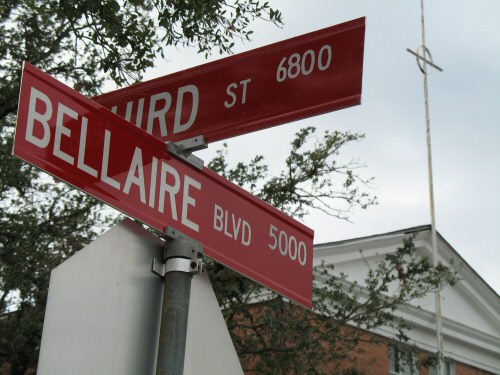
On the grid, Bellaire fit in with Houston's block-numbering sequence, but commissioned its own police, collected its own trash, and doused fires with its own independent source of groundwater. In the '70s there was a brief effort to form a separate school district, but public opinion saw that for what it was: a desegregation dodge.
The late '60s had been a harrowing time for white homeowners, who comprised virtually all of Bellaire. Once the Fair Housing Act went through, realtors discovered they could sell one house to a black family in the middle of a white neighborhood, and suddenly all the surrounding homeowners needed a realtor, too. Prices fell while sales soared. The losers were those residents who didn't or couldn't bail out right then, whose resale values quickly fell beneath their mortgages. Far from alleviating racism, housing desegregation hit the pocketbook, and many suburbanites nursed a simmering resentment over a loss they'd had no control over.
Somehow this all just rolled past Bellaire. If a black family lived there in the '70s, I never knew it. In elementary, there was one black apartment kid, and on occasion the county children's home, Burnet Bayland, sent one or two our way. But none of them lived in Bellaire.
our municipal center filled a whole square block with a baseball field, police station, City Hall, gymnasium, and pool, with lush St. Augustine turf filling in the crevices. Over by the water tanks, a plaque marked the memory of William Stevens, one of the town's two young men who went to Vietnam and didn't come back. Nearby, an iron, push-it-yourself merry-go-round got so hot in the summer sun that no one could touch it after 11 a.m.
Every boy I knew played baseball. The high school's team was an annual force within the state, a springboard to UT-Austin, producing Jose Cruz, Jr., Chris Young, and Chuck Knoblauch.
At our city ball field, though, nobody felt like a big deal. Our parents watched us play, perched on plank-and-angle-iron grandstands, surrounded by the smell of popcorn and sidestream smoke. If you were at least 12 years old, and not known for clowning, the league manager might pick you to announce the batters on the PA from a booth over the concession stand.
If not, you could still earn yourself a free soda by returning a foul ball to the umpire, provided you got to it before Tony, the scoutmaster's son, who spent every weeknight shagging fouls and nearly got himself killed by passing cars more times than anyone could count. You could also collect enough discarded cups, napkins, cigarette butts, and pop-tops to fill a gallon-bucket, then trade that for a soda at the concession stand. The trick was to put uncrumpled cups upside-down at the bottom of the bucket, to fill space. One old guy who worked the stand would catch that, though. You tried to avoid giving your bucket to him, because he'd empty it, spot the filler, and tell you to start over.
The games began at 6:30 and 8:00. We had lights and an electric scoreboard, with concrete dugouts that flooded every spring. Someone had added a wooden fence around the outfield, but left the rusty, four-foot chain-link outside of it, and you could climb up onto the top pole and peep at the game until an umpire waved you down.
On the field, we chattered at batters; from the grandstands our parents cheered our plays; while outside the chain-link the little kids played mockup games, batting a wadded-up paper cup with their bare hands.
But everything stopped when a call came in to the fire station across the street. The umpire had to pause the game: No schoolboy has ever been born who could do anything other than stand and stare when a fire truck howled past.
twice, as a texas leaguer, i won the Best Sportsman award, though I'm still not sure what for. Coaches usually put me near the top of the lineup because I never swung at anything and the pitchers weren't accurate enough to throw three strikes to one batter.
I played right field because I was afraid of fast-moving balls. In Little League, once I'd gained some confidence, I agitated for a chance at third base. In my first outing there I suffered a fielding meltdown over several innings that cost us the game. I returned to the outfield, which was a nice place to watch those who could, play.
Local businesses sponsored our teams. No matter who you played for, you wanted Charlie's Hi-Lo Auto Supply to buy your uniforms, because everybody knew and respected them, and their team always seemed to fare better. Ditto for Wagner Hardware and First State Bank of Bellaire, names everyone trusted. One year, we had a newcomer, The Blue Note. Only the adults understood why the word "Lounge" had been left off. The bigger mystery was, Who had approached the bar's owner for a sponsorship?
As the sun went down and the cicadas began their evening drone, our unofficial game clock, First State Bank's towering "1" sign, turned slowly over the distant trees, broadcasting the time and temperature. All summer the mercury never fell below 70 and neither did the humidity.
And if your parents allowed, you could spend all evening at the ball park, then bike home all by yourself in the tall shadows of the cottonwoods and sycamores shrouding every street.
bellaire was just a little too big for us all to know each other, but small enough that anonymity wasn't an option.
If we ever had an accident at home (as I did in falling head-first out of a tree one Saturday afternoon), we might find ourselves revived under an oxygen mask held by a schoolmate's father, who was also one of Bellaire's paramedics.
 If we got into trouble with the police, as one of my friends did as a teen, we might wind up cowering across the desk from a sergeant whose son had played basketball on our team. (His conversation with our father would occur in private—possibly the most dreadful 15-minute wait of one's life.)
If we got into trouble with the police, as one of my friends did as a teen, we might wind up cowering across the desk from a sergeant whose son had played basketball on our team. (His conversation with our father would occur in private—possibly the most dreadful 15-minute wait of one's life.)
But as youngsters, we learned not to fear the police. Officer Holloway directed traffic at First State Bank, which in the days before Direct Deposit boasted more than a dozen drive-through tellers and little guidance on how to approach them. Officer Holloway, in his aviator sunglasses and rugged farmer's tan, always found time to proffer a paper bag full of candy and bubble gum to the little ones whose patience had run out during the interminable wait for an open teller.
in a way, there were actually two bellaires. By the early 1960s, IH-610 Loop had cut an eight-lane gash through town. Eastward lay the lesser Bellaire, with smaller houses and, seemingly, smaller, skinnier people, like North Koreans. Their stretch of Bellaire Blvd. had just a narrow strip of parched grass in the median, and they were bordered by two railroad tracks and zoned for Pershing Junior High, which graduating elementary schoolers would run away from home to avoid. (Pershing had vicious upperclassmen who forced you to smoke, and there were fights every day after school. We knew because someone's brother told us.)
The other Bellaire, west of 610 Loop, boasted big front yards, wide avenues, lots of big grocery stores, and the town's only post office. Plantation-style homes lined our stretch of Bellaire Blvd., with fountains and a walking trail winding down its broad esplanade. To new arrivals this must have looked like a trip back to the Roaring Twenties.
After that big opening act, though, Bellaire was all bathos. For most of my youth, I never thought of my neighbors as anything other than regular people.
I once saw a map of Harris County that was shaded according to household income, and right there in the relatively affluent light-gray southwest Houston sat a dark-gray block-letter J: that was Bellaire. That's when I first realized we were different from our neighbors just across the city line.
If other kids hadn't gotten this message, it would dawn on them the day they walked into Bellaire High School. Situated on the southern edge of our town and—as were all our schools—part of H.I.S.D., Bellaire High drew students from its namesake city but also from Houston's Meyerland area, where all the houses had two or three bathrooms and some even had backyard swimming pools.
Looking back, however, I can see that Bellaire had its own grades of relative affluence. Most of the clapboard houses along the curbless, ditch-lined streets north of Jessamine St. bore gravel driveways and flat roofs—low-rent trademarks, as I came to know them. Meanwhile, along oak-shaded Pine and Braeburn, there were two-storey homes with pillars out front and two-car garages tucked behind.
Most of Bellaire's homeowners, though, had three bedrooms, one bath, and one living area. Claustrophobia drove many of our fathers to tack on a den or bedroom, sometimes both.
the first sign of change, in the early 1970s, was a townhouse project that popped up on the corner of Evergreen and 610 Loop. These looked strange to me, with zero lot-lines and little indication of where one house ended and another began. I studied them every time we passed. It was Bellaire's only multi-family dwelling—save for a couple of legacy apartment blocks along Bissonnett—and I never saw the owners; they drove around back through an alley and shut their garage doors behind them. Nobody did any yard work or played outside, because there wasn't any room.
Thereafter, no more multifamily permits were issued. Bellaire knew what it wanted to be, and densely populated wasn't it.
Meanwhile, Houston's overgrowth took an enormous face-plant in the 1985 oil bust. Whole subdivisions emptied, taken over by shell-shocked lenders.
Capitalism abhors a vacuum, of course, and within a few years new industries moved in to fill the void. And at some point, the idea of living close to work began to take root among the new arrivals.

By the late 1980s, Bellaire's secret was out: Residents could commute downtown in about 10 minutes. Developers started bulldozing the city's 3-1 postwar bungalows, replacing them with multistorey brick-façade castles that pressed right up against the property lines. Homeowners who'd bought into Bellaire in the late 1960s for less than $25,000 could recoup their whole mortgage five- or six-fold. Of course, then they'd have to live somewhere else, because Bellaire had been priced well out of middle-class range.
The shaded map went monotone.
Houston had won.
See also Condit Elementary School.
Posted by: Michael Rittenhouse at
08:45 PM
| Comments (1)
| Add Comment
Post contains 2078 words, total size 14 kb.
March 21, 2009
I had such a thoughtful essay in the can.
It was one of those cultural thought-pieces, the kind you can't resist commenting on.
It had to do with my growing into a responsible husband, father, and homeowner, and the effects this has had on my ethics.
Specifically, it described how the sight of thousands of dollars' worth of untended merchandise no longer tempts me, despite the property offenses of my youth, simply by virtue of the type of merchandise in question:
Garden supplies. Who would steal garden supplies?
Gardeners? Homeowners? People with families, mortgages, a reputation and neighbors, who would never risk all that just to make off with a few bags of cow manure and step-stones?
Of course not. So the home centers leave that stuff out front all the time without so much as a video camera trained on it. Because who would—or wouldn't—steal it?
To put that in perspective, imagine if we were talking about chrome wheels.
Anyway, I had this essay all mapped out and written, the kind of thing that makes you, the reader, place your chin in your hand and say, "Hmm. That Rittenhouse sure is insightful."
Then I saw this.

A small businessman does not spend hundreds of dollars on fencing except to stem hundreds more dollars in certain losses.
So, someone was making off with the local hardware store's bagged mulch. Or cinder blocks. Or cow manure.
Today, I am ashamed to be a resident of Rittenhouse Estates.
unrelatedly, this weekend the rittenhouses started a garden of their own, and paid for everything themselves.
Except the framing of the bird net. Most of that was wood I "found" when the local developer flattened a house and left the wreckage untended overnight. Otherwise, it would've gone to a landfill, so there's my moral vanity.
I also came across a 16-foot 2x4 on Inwood Road one afternoon, stopping to heft it atop the Explorer with no idea, at the time, how I planned to use it. Split in two, it made the perfect top lengthwise members of the framing.
Also the horse manure I picked up, free of charge, at a nearby stable where the owner piles it up next to his fence fully expecting his neighbors to cart it off.

It's not child labor if it's family.
Right, then. I did pay for the bird netting and the seeds. Here's the result.

You can't see the nylon mesh in the picture, and neither could Wolf Dog when he spotted an unauthorized cat in the alley and executed his usual high-hackles charge-to-the-fence, which ended with a very confused German Shepherd tangled nose-first in the bird net. As you can see, I immediately propped various implements up against it to remind him he no longer has a straight shot to the chain-link.
we suburbanites go to such lengths planting gardens, knowing we'll probably get two meals' worth of vegetables out of them. I'm just grateful I don't live in the era of subsistence farming. Squeeky and I would have starved to death, our fossilized skeletons found clutching hoes in the middle of an empty field, having failed to get a single tuber to take root.
Nature seems to know better: Overwhelm adversity with numbers. Currently, the giant elm tree is in must, dumping shovelfuls of this stuff

… which resembles oatmeal, onto every square inch of Rittenhouse.
Including the gutters. Even if I'd sprung for those leaf-guard types, they'd still clog with elm-meal.
I'll report back shortly on the garden's progress. We've sown tomatoes, basil, cilantro, sweet peppers, sugar peas, and broccoli.
Here's Squinx's contribution:

Happy springtime.
Posted by: Michael Rittenhouse at
08:22 PM
| No Comments
| Add Comment
Post contains 606 words, total size 5 kb.
March 16, 2009
Where: Metro Orange Line, Washington, D.C.
When: 5:40 p.m., July 8, 1988
You: Slim, straight-haired brunette holding a binder. Your right hand has only one finger and a thumb.
Me: I thought you were pretty hot-looking for a girl with only seven fingers.
— ¤ — ¤ — ¤ —
Where: Club Soda, Washington, D.C.
When: May 14, 1988
You: Gave my buddy a prison-yard stare as your friends dragged you backward out the door. Your girlfriend stayed behind to warn us, "He will kill you."
Me: All the rest of the night my friend kept telling me what a moron you were. Which means you scared the crap out of him.
— ¤ — ¤ — ¤ —
Where: Westbound U.S. 183 near Valley View Lane, Irving, Texas
When: June 17, 1996
You: Ran up behind me in the fast lane pretty quick. I must have been daydreaming, because I didn't notice until your pickup filled my rear-view, and I'm usually conscientious about yielding to faster traffic. Anyway, instead of just passing me on the right (which is illegal, I know), you kept riding my bumper—which is also illegal, and even more asinine. So I touched my brakes to encourage better manners before I changed lanes. But you wouldn't ease up. Then you swung completely around me and, to cap it all off, deliberately cut me off and stood on your brakes. I nearly lost control trying to dodge you.
Me: Dude, what? It's just a lane.
— ¤ — ¤ — ¤ —
Where: Inaugural Ball for Young Americans
When: January 20, 1989
You: The sweetest-looking girl I'd ever seen up to that point, you kept holding eye contact with me and smiling from about 15 feet away, all the while ignoring your date.
Me: Confused. If you thought I looked good in the too-short tuxedo I bought used from a Mexican dry cleaner's, I probably should have proposed to you on the spot.
— ¤ — ¤ — ¤ —
Where: University of Texas at Austin, east mall
When: April 9, 1985
You: A cheerleader from my old junior high, you were one year older and so pretty that most of the guys were afraid to speak your name. At college that day, you were walking opposite me toward the shuttles.
Me: Saw a flash of recognition as we passed. Also noticed the effects of late-adolescent acne on your face and thought, Man, even I might have a shot at you now.
— ¤ — ¤ — ¤ —
Where: Northbound I-95, Baltimore, Md.
When: March 5, 1989
You: Cute girl in the car behind me in the tollbooth line. On a whim, I paid your toll. You looked at me as I pulled away, then kept at least 500 yards between us for the next hour.
Me: Yeah, I don't know what I was thinking. Can we start over?
— ¤ — ¤ — ¤ —
Where: Cactus Cafe, Austin, Texas
When: Election Night, 1984
You: Showed up to counter the abundance of College Republicans who turned out to watch the returns at a campus bar, one of several locations spot-covered by NBC that night. When the camera turned your way, you held up a hand-lettered sign reading too bad hinkley missed. You couldn't hear my angry shouting over the din.
Me: You misspelled "Hinckley."
Posted by: Michael Rittenhouse at
06:02 AM
| Comments (1)
| Add Comment
Post contains 562 words, total size 4 kb.
March 12, 2009
This is a car dealership in Dallas.

This is going to be a hard time for many, many people.
Posted by: Michael Rittenhouse at
08:36 PM
| Comments (2)
| Add Comment
Post contains 23 words, total size 1 kb.
February 25, 2009
This is a Soviet-era Hind helicopter at the Cold War Air Museum.

Rarely have I come face-to-face with something that was designed to kill me.
Posted by: Michael Rittenhouse at
07:24 PM
| No Comments
| Add Comment
Post contains 27 words, total size 1 kb.
February 07, 2009
I finally delved into Reclaiming History, Vincent Bugliosi's exhaustive history on the JFK assassination, and I hope its publication means we're finally done with this whole conspiracy business.
In sum: All the circumstantial evidence points toward a malajusted 24-year-old Lee Harvey Oswald firing three shots—the last one fatal—from the sixth floor of the Texas School Book Depository.
And that's it. All other claims rely on dubious characters, shifting accounts, and "what if" scenarios.
Furthermore, conspiracy theorists—to a man—when confronted with actual evidence, invariably say, "Well, that was faked." Not "Here's contradictory evidence," but, "They're lying." Then they go on to spiel their favorite, unsubstantiated fantasy.
Before anyone seizes on the term "circumstantial" above, let me note that almost every murder conviction is decided on circumstantial evidence. Premeditating killers usually make sure there are no eyewitnesses. Once you establish motive, means, and opportunity, you pretty much have your perpetrator. That's all most juries see, and that's all that you need to convince 12 impartial people to vote for a conviction. And, they're almost always right.
had i known all this in 1991, when I accepted an index card marked "SS" from Oliver Stone's assistant, then took his production company's invitation to audition for a speaking part in JFK, I probably would've been dismissed after a few days for continously smirking on the set.
Yes, it actually happened:
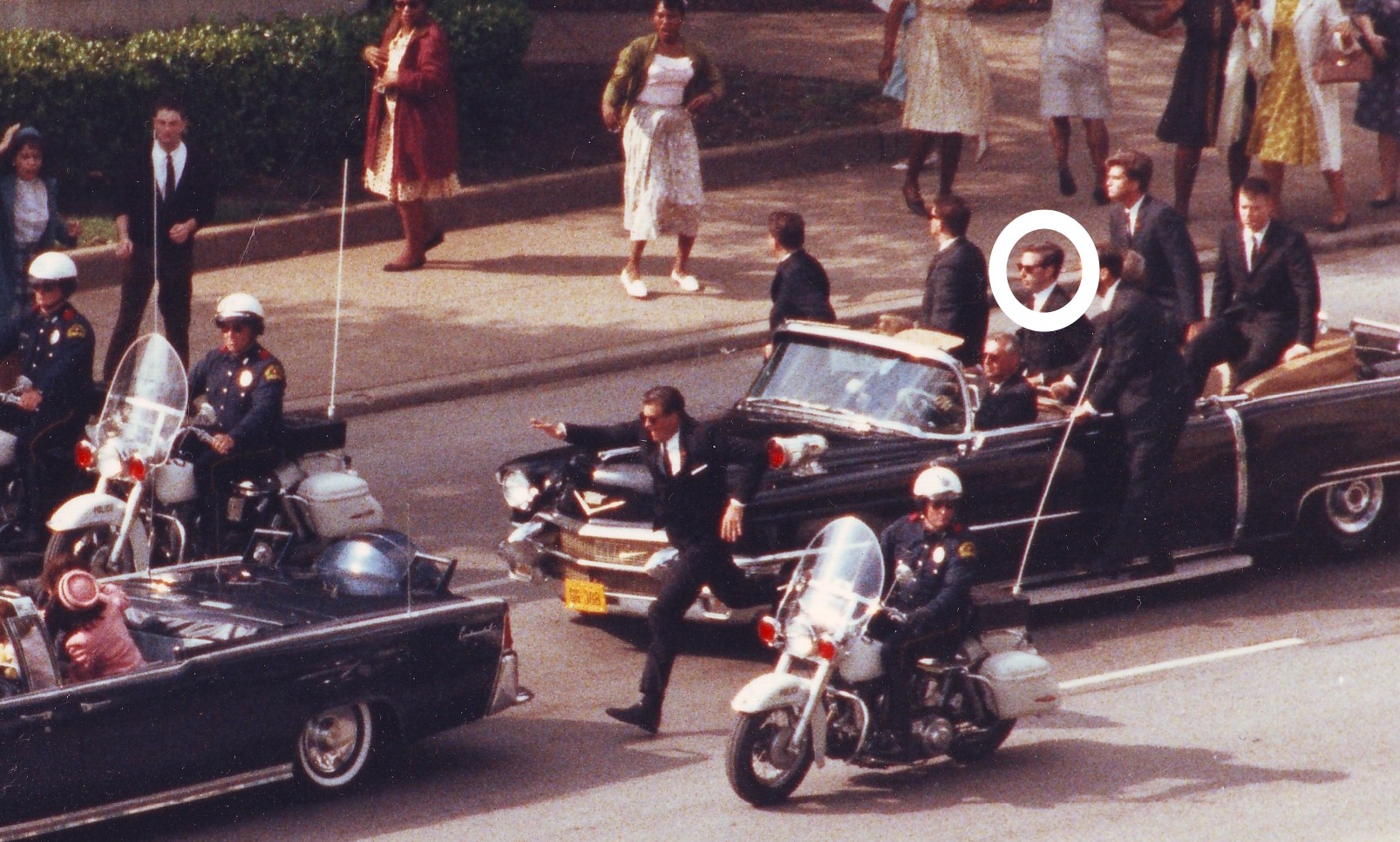
(If you can't part of history, at least be part of fake history.)
The speaking role didn't quite materialize (someone delivered the line, "Secret Service, ma'am, you're coming with us" more effectively than I), so, for the parting gift, I joined hundreds of other would-be actors standing by in a warehouse for our call-in to re-enact the JFK assassination in Dealey Plaza. I seem to look the part of a Secret Service agent, so that's where they put me.
Over two weeks, we ran the motorcade sequence 32 times, at various intervals changing camera angles and experimenting with different methods of simulating the explosion of President John F. Kennedy's skull.
For several runs, they duct-taped blood packs to the car just behind the actor's head, with a radio-controlled charge beneath. Other times, they pressed a toupeé to his head and ran hoses from beneath it to a goo-filled tank.
From the perspective of the Secret Service on the chase car, the blood packs were our favorite special effect. (I know this is gallows humor, but indulge me.) When the packs exploded, a shower of red corn syrup erupted, dousing us all with a sugary mist. By the time our vehicles reassembled on Main Street for the next take, a carful of guys in black suits stood gingerly licking their lips, in need of a good sponging.
back to bugliosi's book. By the time he gets done chronicling Oswald's life, it's hard to feel anything but pity for the gunman. He grew up without a father, under a domineering and delusional mother, and spent all his short adult life looking for a way to wreak himself on the world.
Taken with the socialist fantasy, he first "defected" to the Soviet Union, where he found only indifference and a factory job. He took a beautiful wife, then "re-defected" to the U.S., where, once again, he found no one interested in his self-engineered drama. His feints of public sympathy toward Cuba only exposed his flaky nature, so when he learned that the President of the United States would pass unshielded by the place of his menial employment in a couple of days, he saw his chance for immortality.
His only mistake, in my estimation, was in not planning his escape. Months prior, he'd already tried to assassinate General Edwin Walker (and missed by a fluke of marksmanship), eluding suspicion only because the act was so random. Perhaps this emboldened Oswald. After killing the president, if he had simply paused for time in downtown Dallas, taken a bus to some port city, then fled to Cuba, he'd likely have been a hero of sorts to the Leninists. And, quite possibly, triggered World War III.
Instead, Oswald clumsily carried out a one-off crime, forsaking his impoverished, young family for … nothing. No fame, no money, not even personal vengeance.
The banality of Oswald's story spurs some to look for evidence that something bigger was at work. You mean no one rewarded him for his bathetic dive?
Nope. Some criminals are just that pitiful. Watch COPS some time if you need more on that.
jack ruby is more complicated. His bizarre coda to the whole episode still leaves me shaking my head. Why would a business owner throw his life away to kill some pipsqueak sure to be executed anyway?
To answer that question, you have to know Ruby, which I don't, but a poignant episode in Bugliosi's book struck me as illustrative. In the wee hours on the night after Kennedy's killing, Ruby summoned a young man living in his apartment—a photographer by trade—to the intersection of Hall St. and North Central Expressway, to take a photo. I used to live in this area, and it has never been a good place to be any time of day. In fact, I remember running the traffic light late at night so I wouldn't set myself up for a carjacking.
Anyway, Ruby called his tenant out there past midnight just to take pictures of an anti-Kennedy bill that had been posted on a building. Ruby's anguish over Kennedy's death further drove him to close his nightclub over the weekend, which is the only time most nightclubs make money. This action, which would only hurt Ruby himself, still left him unsatisfied. He needed to assuage his conscience, an underlying sense of right and wrong, which Oswald had singlehandedly defiled. The happenstance of passing, armed, right by where Oswald would be exposed in transit, matched the almost unbelievable circumstances that had Oswald employed in a warehouse along Kennedy's motorcade route, during a lunch break.
In short, Jacob Rubenstein did what many 1960s-era people wanted to do: Kill the man who'd murdered their hero.
at various moments, i looked up from reading bugliosi and pondered that the very house where I live had been standing for only seven years when Kennedy was killed a few miles away, and when that happened its occupants probably glued themselves to the radio or television for most of that day.
In the hours following, Oswald walked streets and sidewalks that still look pretty much the same as they did then. I could retrace his steps under the same oak trees that shaded him on his way. The addresses in Bugliosi's book refer to buildings that are still there. Even a few of the characters walk the earth today.
Marina, Oswald's forlorn wife, still lives in Dallas. I wish her well.
Through all this, however, President Kennedy still seems like an abstract to me. I say that not to denigrate him, but to underscore that his life ended on November 22, 1963. Meanwhile, the lives of everyone associated with his demise seem to have continued, in living color and in print.
Kennedy was a hero of World War II, a Cold Warrior, a man whose death seemed to mark the end of the placid 1950s before a turbulent and ugly decade that would rend the United States in a way that probably would have appalled him. Everyone, it seems, reads his own story into JFK's, and I'm no better. But no one disagrees that his death served as a demarcation into a postmodern era, one in which moral certainty became irrelevant, and the psychoses of deviants wrought themselves onto a nation of innocents who still reel under the burden.
Posted by: Michael Rittenhouse at
08:42 PM
| No Comments
| Add Comment
Post contains 1283 words, total size 9 kb.
February 01, 2009
These are my accoutrements. (Clockwise from top left: Bluetooth, Razr, aluminum wallet.)
When I was a teen, I never imagined I'd actually get to be James Bond in my lifetime.
The day has arrived.
I still have to make my own breakfast, though.
Posted by: Michael Rittenhouse at
08:54 PM
| No Comments
| Add Comment
Post contains 46 words, total size 1 kb.
January 26, 2009
'Tis the season when the cold morning air carries the roar of traffic to Rittenhouse Estates from the Interstate, two miles distant.
Texans know summer will resurface several times before winter finally lays its miserable wet self upon us for good. Even the individual days arc unpredictably: We'll don jackets for the morning commute, then forget them at the office because by lunchtime it feels like May again.
Then, two days later, a blue norther will sweep through mid-day, and we'll be grateful we didn't take that jacket home earlier.
'Tis also the season for a new phone. Enough has been written about "unboxing porn," so a video will have to convey 1,000 words for me.
Perhaps my excitement is rooted in those times when kids goaded their parents to order junk out of magazines, which always required something called a "money order" and six to eight weeks for delivery. A boy could pass puberty before that package arrived, but the anticipation built each day.
And even though I order stuff all the time now, the thrill remains. As you can see.
Just lately, though, I reverse-engineered the same thrill for somebody else.
squeeky bought a cradle back in 2001, before I was ready to acknowledge we were due to start making children. Its arrival at our house made for a story in itself—the way her girlfriends, who had accompanied her on the antiquing trip, grinned at me like cannibals as I stood behind their open van, contemplating my fate.
But soon after Squinx's arrival a year or so later, we found the cradle worthless: Daughter would not rest in it for one minute without shrieking.
We didn't bother trying with Little Roo, figuring these to be the sort of children who prefer to sleep atop a human. So the cradle sat in our bedroom collecting dust and barking shins for seven years.
Finally, we decided to let it go. As it appeared too big to ship, we posted pictures on Craigslist and waited for the next romantic to come along.
Of course, the only soul who took interest sent an e-mail … from Alabama
at first, i figured the inquirer had just a passing interest. Once I got her a packing-and-shipping estimate, she'd forget it. But a funny thing happened at the UPS Store, and at FedEx, and at the Post Office: Nobody wanted to ship this thing because it went off the scale, dimensionally.
I finally called a freight company and threw them the numbers. Of course, we'll ship it, they said. For an ungodly sum, and we won't pack or insure it, either. I shrugged and relayed their quote to Alabama, tacking on $40 for my trouble.
She bought it.
Ever feel like a dog that's finally caught a squirrel, then doesn't know what to do with it? That's about how I felt. I hadn't really expected anyone to want this thing, nor to pay what we'd paid for it, plus what it would cost to transport across three states, but here I was. How on earth would I actually get it there?.
I found a big-enough cardboard box at—where else?—a cardboard-box store. Sizing the two up in my garage, I briefly considered wrapping the cradle in plastic then filling the box in with expanding foam, but wondered if the box wouldn't explode several hours later. Instead, I raided my office trash for excelsior and styrofoam, then dedicated several hours to spatial thinking and experimentation. I would have to cushion the edges so that the inevitable jostling wouldn't pit cardboard against wood—a fine finish always loses that battle.
Yet, to pack the cradle in there tightly would risk breakage if some monkey decided that two feet was a reasonable distance to drop it. A loose pack would have to do.
Here's the cargo, standing on end. The mattress would prove useful padding inside the top.

And the final form of things, with bubble wrap around the legs.

The shipper would only pick up at a business address, so here's how I got it to the office.

Power lines made me a bit nervous, as did traffic lights. I drove at school-zone speeds to avoid rollover.
Within a few hours a guy showed up at our loading dock and took possession. I said a prayer and went back to work. I'd already cashed the woman's check, and with no insurance on the package, I was at the mercy of maybe a dozen unknown handlers between Dallas and Birmingham.
She e-mailed me two days later, thrilled with her new piece of furniture.
So, a happy ending ... and happy beginning for her grandson.
I hope he likes getting stuff in the mail, too.
Posted by: Michael Rittenhouse at
07:26 PM
| No Comments
| Add Comment
Post contains 796 words, total size 6 kb.
January 18, 2009
I can tell we're in a recession. Every other commercial on AM radio begins with, "In these difficult times...." and goes on to hawk anything from tankless water heaters to investment advice.
But the most damning evidence of our economy's sorry state is the end of the martini's 20-year run as the indoor beverage of leisure. You cannot enjoy a martini when you—or your neighbor—are unemployed. And Noilly Prat, we hardly knew ye.
no one knows this, but i singlehandedly started the martini craze in 1986. Partly inspired by Berke Breathed's character, Steve Dallas—who often posed behind a then-out-of-fashion martini—and partly fed up with the waist-deep flood of frozen margaritas swamping every boozery in Austin, I initiated the Martini Society at the University of Texas.
We would need a sponsor, of course. I figured I'd aim for the top, so I called the Screen Actors' Guild in Los Angeles and asked for Dean Martin's agent.
The number they provided led me to a portly man smoking a cigar and sunning his white-haired chest at poolside. At least that's the picture his leathery, Brooklyn-accented voice painted for me with the word, "Hello."
I began my spiel, and he interrupted me about one-third in. "Mr. Mah-tin isn't a drunk," he blurted. "That's just paht of his act." Our conversation went downhill from there.
Correctly figuring I would never find a responsible adult willing to lend his name to an organization of college-age drunkards, I gave up on the club idea and just set about enjoying martinis myself. An old-fashioned drinkers' bar on First Street obliged me, providing my first encounter with a glass of cold gin and three olives. It tasted like cologne. At the time I was dating a much younger girl, and after I'd taken the risk of smuggling her into the place underage, she embarrassed me by ordering a wine cooler. So even though I wasn't really enjoying the exalted brew-mix in front of me, I felt obliged to finish it.
despite the rocky start, i persisted drinking martinis mainly for what they said about me: that I am thoughtful, mannered, cautious, and defiant.
In the age of MADD, the martini seemed barely legal. It is, as noted above, essentially a serving of cold, hard liquor without even so much as an ice cube to dull its wallop. I'd heard the phrase "three-martini lunch," and after my first two-in-a-row I wondered how anyone, after downing three, could find the exit. Martinis are weapons-grade barfare.
Yet they require of their consumer a certain reserve. The glass itself rules out haste. Lacking a handle, and shaped for maximum spillage if jostled, the martini demands a wide berth and a deft touch. Its drinker must not be in a hurry, nor can his coordination suffer as the alcohol infuses him. It may be needless to say that only an accomplished lush should even try one.
Further underscoring its leisure status, on its first encounter with the tongue the martini bites too hard to be drunk quickly. This is true even if it is served—as it should be—near the freezing point. However, the flavor matures as the drink warms up. The olives astringe themselves of their pickling and the essence of juniper cooks off the surface, waking the nostrils. Martinis adopt their customer.
of course, an accomplished martini drinker requires a fine martini, the making of which necessitates skill and commitment.
In the early '90s, Sanders and I discovered a short-lived bar on Lower Greenville, appropriately dubbed Martini's. Its tenders, Danny and Carol, took the art of presentation up a few levels. It was there that I fell under the sway of what I call the Transitory Ice Floe.
 That's the wafer of frozen vermouth that drifts, for a few precious moments, atop the little cone of frigid gin. This phenomenon only occurs when both the serving glass and the liquor stay below the freezing point right up to their meeting. Ideally, the vermouth is drizzled around the inside of the glass—swooshed if necessary to spread it out—followed promptly by icy gin. The sweet wine then rises, molecule-by-molecule, to the top, where it coalesces into a fragile island. Like the flames on a dessert, it's temporal, necessary, and theatrical, and it cannot be consumed. Rather, its effects on the rest of the dish are what matter.
That's the wafer of frozen vermouth that drifts, for a few precious moments, atop the little cone of frigid gin. This phenomenon only occurs when both the serving glass and the liquor stay below the freezing point right up to their meeting. Ideally, the vermouth is drizzled around the inside of the glass—swooshed if necessary to spread it out—followed promptly by icy gin. The sweet wine then rises, molecule-by-molecule, to the top, where it coalesces into a fragile island. Like the flames on a dessert, it's temporal, necessary, and theatrical, and it cannot be consumed. Rather, its effects on the rest of the dish are what matter.
When Danny of Martini's handed the first of these to me, I wanted to applaud. A golf clap, of course.* In this, the seventh year of my martini age, my taste buds had matured, and Bombay Sapphire DNA-matched my chromosomes. To this day, Danny remains my favorite bartender.
my friends began to associate me with my cocktail of choice, and one Christmas a half-dozen sterling-silver martini glasses appeared under my tree. Of course, martinis should never be served in metal (it warms too quickly), so I wrapped red bows around the stems and hung them on the next year's tree. (This does not diminish my gratitude for the gift, of course.)
At one of my places of employment, we had a discreet tradition of Friday-afternoon cocktails, and I began to signal its arrival by walking around the office with thumb and two fingers extended in the classic martini-and-cigarette fashion. It didn't matter whether we had the fixings for such on hand; "martini time" meant casual drinking, and soon enough, bottles began to emerge from desk drawers and the whole staff seemed to loosen its collective necktie. Martini time worked whether actual martinis were served, or not.
not long after that, i married, and my wife and I sought a spiritual home, which in the South especially can jeopardize one's drinking habits. The further one gets from orthodox Christianity, it seems, the more proscriptions one finds regarding life's little indulgences, especially alcohol. This is notwithstanding the fact that to this day, Christians worldwide are still talking about Jesus as Cana's most famous bartender.
We settled on an Anglican church, close enough to Roman Catholicism to mitigate my fears. The rector, who had suddenly found his parish infused with a multitude of young couples that year, invited all of us over to his house one night for drinks. Imagine my glee when, as soon as we entered, he offered me a martini.
This man had all the accoutrements plus the cryotechnics. I watched, transfixed, as he skewered three olives, laced a frozen glass with vermouth, drew a bottle of Tanqueray from the freezer and poured it over a mixing vessel full of ice. This, in turn, he poured into a traditional, three-fingered serving glass.
A Transitory Ice Floe formed on top as he handed it to me. One wonders if even the guests at Cana had it so good.
in the broad, cultural picture I noticed others adopting the martini's panache. Nineties prosperity needed a symbol, and our cultural alchemists came up with cigars and martinis (a flavor clash, BTW), which dovetailed nicely with the '60s retro fashions already in progress. The movie poster for Swingers featured a 20-something thrusting the familiar V-shaped glass at the camera in the way Eddie Murphy used to brandish a pistol. The film capitalized on the theme of "lounge culture," an ironic name, since the lounge was where promoters put acts that weren't popular enough to fill the main hall.
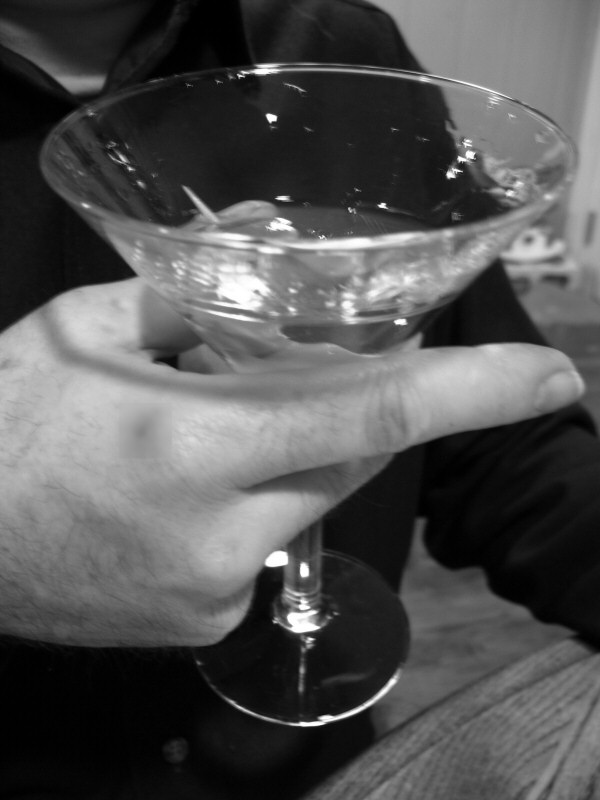 Locally, another Dallas bar flourished as Martini's fell, calling itself Martini Ranch, unfortunately with a drink menu too vulgar for anything but this footnote. Often, vulgarity is needed for popularity. And by the middle '90s everybody, it seemed, had suddenly become a martini drinker.
Locally, another Dallas bar flourished as Martini's fell, calling itself Martini Ranch, unfortunately with a drink menu too vulgar for anything but this footnote. Often, vulgarity is needed for popularity. And by the middle '90s everybody, it seemed, had suddenly become a martini drinker.
I saw all this as flattering, since I'd started the whole craze a decade prior and this is what the pop culture threw up in its desperation to latch onto a trend.
Yet, none of it could come close to the effortless cool of Dean Martin, the original. I don't know whether he invented the three-fingered, cigarette-and-glass pose, but he owned it. And the rest of us can only wish we were that smooth.
Noilly Prat's abandonment is, I fear, just the beginning of the martini's second demise. I may not live to see its next revival.
Whatever. I'm a father now. I'm not supposed to be hep. In fact, I'm comfortable being not hep.
Just as I was in 1986.
* When Martini's closed, Danny went on to 8.0 and then to Al Biernat's. Carol's whereabouts are unknown, which is too bad, because at least to Sanders and me she is well-remembered. Martini's bartop had a cutout in the middle where a dozen glasses rested upside-down on a bed of ice. When the bartender lifted a glass off, a conical ice formation remained, for which there was no name. Sanders and I dubbed them "carols."
Posted by: Michael Rittenhouse at
02:25 PM
| Comments (1)
| Add Comment
Post contains 1476 words, total size 10 kb.
December 28, 2008

By an extraordinary coincidence, I just recently met the current principal of my elementary school. Calling him by first name gave me a textbook case of cognitive dissonance.
In my mind, the staff at Condit Elementary will always be female, twice my height, shellacked with hair spray, and dressed for the '70s (in some cases, the '60s and '50s, in keeping with Bellaire's fashion speed). They resembled our mothers enough to prevent our ever challenging them; I don't recall any outright defiance in the classroom, ever.
Enough of them smoked to make the teachers' lounge a room you could locate blindfolded. Only one teacher was young enough for me to have a crush on, and she was an assistant. They all drove sedans.
Our principal, a tense, wrinkled woman with beehive hair and a pointed face, paid visits to our classrooms over any minor crisis. She lectured us holding her arms straight at her sides, rolling her fingers as if she'd just noticed cobwebs on them. To me, this looked like a threat to use her nails on us. However, to my knowledge she never actually laid a hand on any child; being made to wait outside her office for an hour was the worst kind of punishment.
That's not to say we had no fun. The recess game of choice was kickball, played with a big, red, pneumatic ball that drop-kicked with a bang. The challenge was getting it over the fielders' heads but short of the six-foot chain-link fence; that was an out, and the teacher had to closely monitor whoever she chose to retrieve it. You didn't want to send the most eager kid, as he was also the most likely to run headlong into a passing car.
Once that ritual had worn out our teachers' nerves, they switched us to hitting a volleyball with our fist. No way could we put it over a fence, mainly because it was pumped up hard enough to make our knuckles bleed.
On late spring and early autumn days it must've been 90 degrees out there on the asphalt. Somehow we didn't seem to mind. Teachers must have hated recess.
I remember all my teachers' names. I would feel strange including them here because by now, many of them are dead.
There's something to ponder: For all the sing-songs we made up about "killing" our teachers, we never stopped to think how we'd feel once they were actually gone.
the kitchen was staffed by two black women in hair nets. If they had help feeding 400 kids, I never saw it. One called us "honey" in the Southern way that meant something like the opposite: "Honey, don't you bang yo' tray like that," and when you saw her inch-long fingernails curled over the edge of your cobbler bowl you knew she had leverage you didn't want to think about.
The two of them baked vast sheets of tall, brown-topped yeast rolls that melted in your mouth; the golden edges came from butter ladled on as they emerged from the oven. You could smell them a block away. One time somebody's mom persuaded them to share the recipe with all of us, and none of our mothers ever got it right.
A hot plate-lunch cost $.40 in 1970, inflating to $.95 by '76. Breaded beef cutlet was my favorite, because I could sop up the gravy and mashed potatoes with the yeast roll. We could get an extra bun for $.05, and cutlet day was the one to splurge on. The half-pint carton of whole milk was never enough; the bigger boys always bought a second.
We dined eight to a table in the "cafetorium," which always smelled of hot butter, polyurethane, and disinfectant. Each day the custodian broke down all 20 tables to clean the floor. One afternoon, all the fourth-grade boys were sent to help him. That was when the fourth-grade girls, rounded up into one classroom, saw a special movie, which none of them would talk about later. At least not with the boys.
one day our third-grade teacher took an empty desk in the front of the classroom, turned it around, and sat down, signaling the start of a monologue that would, in short order, have us leering at the clock and doodling.
She talked vaguely and at length about two new students who would be joining us that week. We had no idea why this was a big deal; previously, new kids just showed up looking terrified and took a seat in the back until they figured out how to fit in.
Before the next morning's opening bell, as dozens of white kids and a smattering of Hispanics played pick-up games all over the schoolyard, a taxicab rolled up to the front gate. Two black children got out and were escorted to the office by our assistant principal. Later, after we'd all settled into our classrooms, she led them to their respective third-grade teachers, who introduced them to us as Ruby and Delano Johnson, brother and sister.
This was no Little Rock Central High moment. Nor was it Brown v. Board of Education, because neither of the children lived near Condit. They hadn't been denied access to our school for their race; in fact, they had been enrolled precisely because of it.
And with that single act, the 400-pupil Condit Elementary was desegregated.
I have no idea how that measure got approved, but I imagine that in its wake, there was no small amount of look-busy whistling around H.I.S.D. headquarters until some federal judge turned his attention elsewhere.
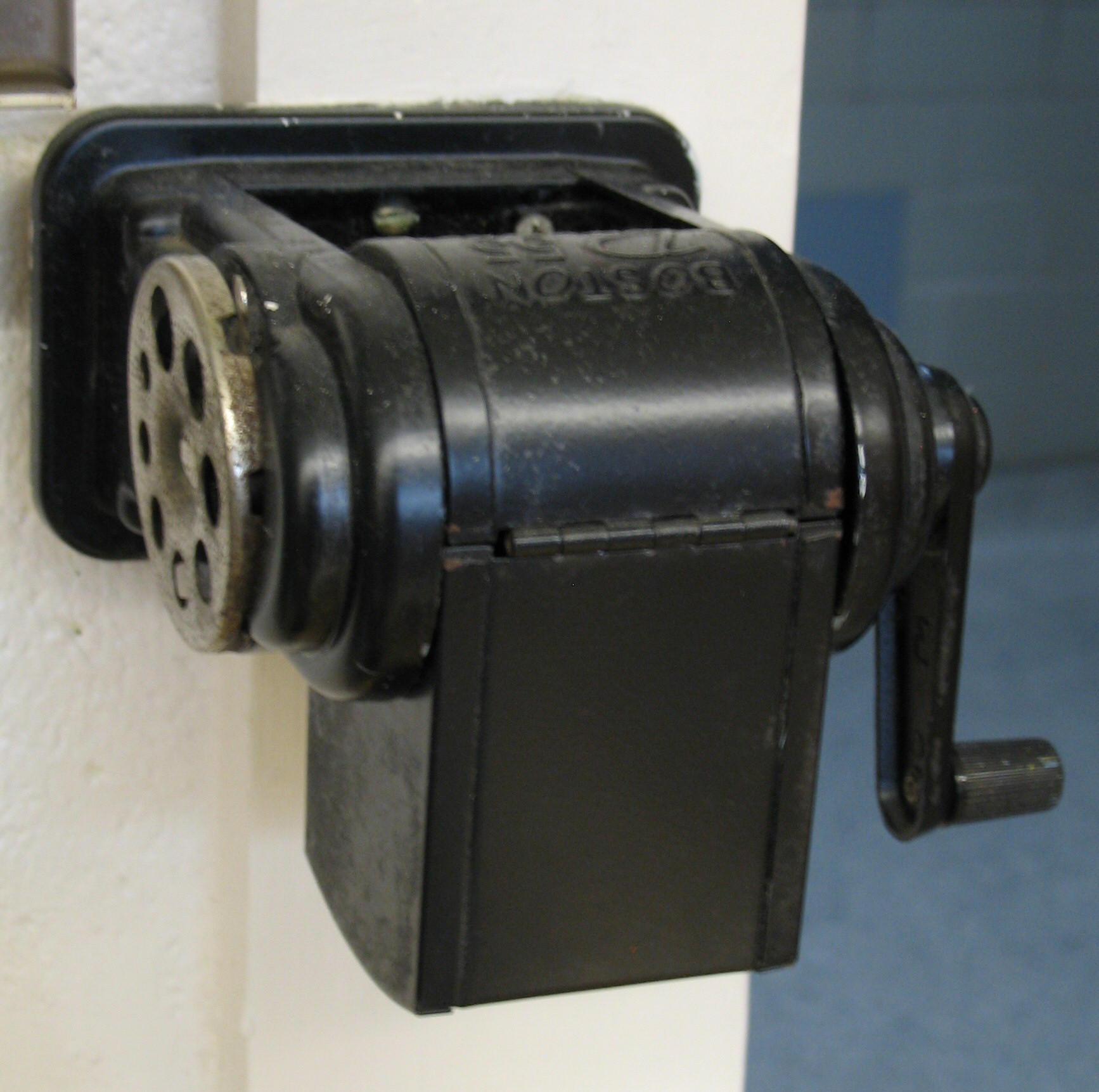 amid these warm and quirky memories of elementary school, I have none for what I received in the way of actual education. By the time I entered kindergarten, I knew how to read. My classmates broke into applause after I buzzed through a whole page in our reading-book, stumble-free. So, the first grade—of which many hours were spent in a "reading circle"—taught me mostly how to daydream with gusto.
amid these warm and quirky memories of elementary school, I have none for what I received in the way of actual education. By the time I entered kindergarten, I knew how to read. My classmates broke into applause after I buzzed through a whole page in our reading-book, stumble-free. So, the first grade—of which many hours were spent in a "reading circle"—taught me mostly how to daydream with gusto.
My first-grade teacher at least noticed that I was ahead of the game. One day she escorted me around to the other classrooms to boast that I had spelled "Rumpelstiltskin" correctly after hearing it once. Later, the same teacher traipsed me down the hall to show the results of my Iowa Test of Basic Skills to the other teachers; I scored in the 99th percentile across-the-board.
But there was no talk of advancing me to a higher grade. I would be allowed to progress through school no faster than the slowest student my age.
at some point the boredom drove me to feign illness just to get out of class. "Miss Scott, my stomach hurts," I'd say, so often and so predictably that she'd have the hall pass ready when I reached her desk. The school nurse always asked if I'd been to the bathroom, and I always answered yes, and several times the ploy enabled me to go home. Eventually my family doctor pronounced me healthy; the mystery ailment—tedium—was never identified.
My second-grade teacher took less interest in me. She would retire at the close of that year—meaning she'd been in the classroom since D-Day—and she pretty much phoned it in. We endured a daily chore called "seatwork," which involved filling blanks on mimeographed pages while the teacher read a novel. Missing letters, numbers, words, that sort of pedantic stuff—all well below my level and so boring I couldn't stand it. No sooner had the smudgy blue sheets hit my desk than I checked out, Calvin-and-Hobbes style, off to an adventure in my head. At some point the teacher called my mother in to discuss my flagging participation. Neither of them seemed to have any insight, and I couldn't explain myself. I simply didn't want to do such dreadfully repetitive work.
In the third grade, I had the blessing of a teacher who recognized my aptitude. She flattered me in a note to my parents, calling attention to my "God-given talents." Still, I don't recall her doing much on my behalf; grade advancement was still off the table, and I never heard of anyone else getting bumped ahead.
By this time, the aptitude tests classified me a full two years above grade.
by fourth grade i had begun to view teachers as adversaries. Few of them seemed very bright—I corrected their English so often they threatened to dismiss me—and many appeared to be marking time rather than taking interest in their charges. I started acting out in unconventional ways—signing my papers with cartoon-character names, for example—because in those days, conventional disobedience brought corporal punishment.
 In my last couple of years at Condit, I studied nothing, and that habit served me poorly the rest of my academic years. I never learned how to learn things unless they sparked some interest within me. My fantasy world shielded me from the grinding boredom of textbooks, chalkboards, and repetitive exercises.
In my last couple of years at Condit, I studied nothing, and that habit served me poorly the rest of my academic years. I never learned how to learn things unless they sparked some interest within me. My fantasy world shielded me from the grinding boredom of textbooks, chalkboards, and repetitive exercises.
In the final weeks of sixth grade, I remember the excitement when a representative from the junior high came to offer us course sign-up sheets. I elected violin and French, eager for something—anything—to show that I could rise to a challenge if only one were available. These foreign disciplines would be my way of breaking free, soaring high over the pack, unleashing my potential.
Both courses filled up before I got there.
See also Bellaire: Biggest City in Houston.
more...
Posted by: Michael Rittenhouse at
02:30 PM
| Comments (5)
| Add Comment
Post contains 1953 words, total size 13 kb.
December 15, 2008
We slaughtered another pine tree for Jesus.
Poor thing was just minding its own business, pumping out prickles and oxygen and sponging up CO2, and perhaps wondering, for the dozenth straight year, how all its neighbors came to grow exactly 10 feet and 90 degrees from one another.
Then these five humans showed up, and the biggest one leaned over and started hacking at its trunk. Less than a minute later, the world turned sideways and the little humans cheered. It would be a long ride to Dallas atop a cold SUV.
We go to Lone Star Pines every year because the trees are live, pretty, and cheap, and it's only an hour away. I used to know the owner—still do, though he's now running a peach orchard just up the highway, which I discovered abruptly one summer when he handed me a bag of produce.
B.C. (before children), we would drive out in the convertible, which in Texas you can do after Thanksgiving. Then we started bringing Wolf Dog along, with his jingle-bell collar. The first time out, he met another family's German Shepherd, and the two of them tracked rabbits until they ran out of breath.
This year the Explorer reached full capacity, with wife, both kids, and a cousin in seats, with Wolf Dog at tail gunner. He likes the rural surrounds, no fence and no limit to the number of scents he can memorize. The horses, as usual, regarded him as a colt.
 I don't know what breed these are, but they live next to the Christmas-tree lot. We bring apples because they seem to like them.
I don't know what breed these are, but they live next to the Christmas-tree lot. We bring apples because they seem to like them.
Lone Star's operation runs as smooth as a four-speed automatic. We climb aboard a hay wagon and ride out to wherever we think our tree might be waiting. (We usually disembark at the far end to visit the horses.) Then we wander back toward the sales house, sizing up our potential victims. Rittenhouse studies the trunks for straightness; Squinx thinks the smallest ones are cute; Squeeky cares that the needles aren't so dense that ornaments won't have anyplace to rest; and Little Roo heads for the nearest fire-ant mound.
The trick in selecting your own tree is getting the scale right. On a 50-acre lot, the trees look pretty small. That changes when you get home and realize yours will never fit through the door. Height matters, too. We figure that with eight-foot ceilings, the perfect tree is about my height.
Last year, Little Roo couldn't have been trusted not to pull an indoor tree over onto himself, so we intentionally bought the widest tree we could find and propped it up in the front yard.
This time, Squinx missed the point of our journey by selecting a tree within one minute. I had intended to make the hunt worth the hour's drive, but there was no swaying her, so I unrolled a plastic trash bag, lay down on the damp, sandy soil, and cut the stump loose.
A deep-toothed saw—lent me by the hay-wagon driver—made short work of a four-inch trunk. Squeeky toppled the tree away from me so we avoided any prickly burying of the lumberjack. Then the driver came by and took us all back to the processing barn, where they shake out loose needles and run the carcass through a netting dispenser that narrows the tree by half. Getting it into the house is easier that way. Getting it back out … you're on your own.
Six and a half bucks a foot, and it'll be green 'til New Year's. We let the kids decorate it.

And a Merry Christmas to you.
Posted by: Michael Rittenhouse at
08:01 PM
| Comments (1)
| Add Comment
Post contains 610 words, total size 4 kb.
November 23, 2008
First they laugh at you, then they ignore you, then they fight you, then you win.
—Mahatma Gandhi
The chattering classes are doing their damnedest to quayle Sarah Palin, and I don't think it will work. Reason: She's not afraid of them.
Do you remember this SNL Weekend Update item from 1980? A campaign picture of Ronald Reagan appeared next to Jane Curtin's head as she announced, "Well, Governor Reagan said more dumb things today." That got a big laugh. Candidate Reagan had been characterized as gaffe-prone by the media, mainly because he said things that politicians just aren't supposed to say. Like referring to "welfare queens" or coining the phrase "government is the problem."
See, those in the Washington-New York media axis know that government is a font of sweetness and light, rather than corruption, waste, and indifference. They only consider a politician tolerable if he affirms their view. It must exasperate them that Republicans can't all be like Lincoln Chafee.
But they couldn't stop the Reagan bulldozer on its way into the White House, nor his landslide re-election four years later. Their chief weapons, ridicule and disregard, glanced off of him. He pushed back and his followers surged along in his wake.
By contrast, the commentariat handily dispensed with vice-presidential candidate Dan Quayle, who shared Reagan's skepticism toward big government. But Quayle entered the stage under the direction of a liberal Republican mentor who believed that if he played nice with the media, they would like him.
Sound familiar?
Unlike Reagan, however, Quayle never got to prove whether he had any sand. He said all the right skeptical things but didn't—or couldn't—respond when attacked.
After Quayle spluttered when Sen. Bentsen pantsed him on national TV, then misspelled "potato" before schoolkids, even those Republicans who wanted to defend him didn't see why they should. By the time the media got done with their workout, the punching bag hung empty.
Palin's history suggests she's a different breed. As I alluded above, she too entered the ring under a tamer of sorts, one who kept her from calling up the grit with which she uprooted the established players in Alaska. Now that she's on her own again, I expect to see Palin unleashed.
back in august, i outed myself as a reactionary when, as the details of Bristol Palin's pregnancy emerged, I wondered aloud what the harm was as long as boy weds girl? America needs more babies. I would like to think Palin felt the same way, as a woman who seems to value motherhood and didn't appear disappointed that her eldest daughter wouldn't be spending her fertile years competing with men in the workplace.
I'd have stood and applauded to hear her bark back at the media pack, "Why is this an issue? Are you afraid you won't know the joy of grandparenthood until you're 80?"
Cowards only chase prey that runs. That's why someone who stands toe-to-toe with them and swings right back—Margaret Thatcher, say, or Phyllis Schlafly—never gets invited to a fair fight. The opinion-mongers rely on smear-or-ignore tactics to marginalize conservative true believers, preferring to engage those who cannot or will not defend what they say.
 In their face, Governor. From the moment you took the national stage, you've had 50 million hot-blooded American women as your Minutemen. That's what will make you an irresistible force in 2012. You're a target not because you're scared, but because they are.
In their face, Governor. From the moment you took the national stage, you've had 50 million hot-blooded American women as your Minutemen. That's what will make you an irresistible force in 2012. You're a target not because you're scared, but because they are.
Posted by: Michael Rittenhouse at
07:18 PM
| No Comments
| Add Comment
Post contains 576 words, total size 4 kb.
32 queries taking 0.0306 seconds, 72 records returned.
Powered by Minx 1.1.6c-pink.

